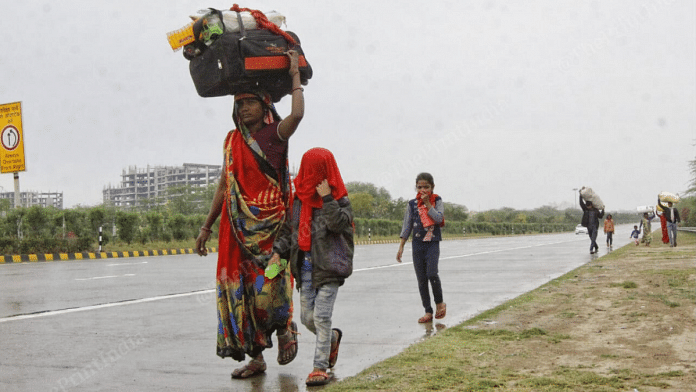When the coronavirus first began to hit headlines, many marvelled at how a contagion was out to get the rich. Sitting in a bathtub filled with rose petals, American popstar Madonna gave a hare-brained suggestion calling Covid-19 “the great equaliser”. It soon became obvious, at least in a country like India, that there couldn’t be a greater lie.
On 24 March, Prime Minister Narendra Modi announced a 21-day nation-wide lockdown to combat the spread of the virus. While the virus, in its initial days of outbreak, may have found its first batch of victims among the rich, it’s the poor–those living hand to mouth–who were at the receiving end due to the sudden lockdown, which came with just a 4-hour notice.
Worst hit were the migrants, forced to tread the devastating, strenuous walk back to their homes in India’s hinterlands. Many ultimately succumbed to exhaustion and died a tragic death in this journey.
An attempt to address a national health emergency has led to a humanitarian crisis, not witnessed by the country in recent memory. It is for this reason, that the migrants’ long walk back home is ThePrint’s Newsmaker of the Week.
Also read: Arvind Kejriwal confused migrants to trigger exodus from Delhi: Bihar deputy CM Sushil Modi
Death by hunger, exhaustion, humiliation
The heartbreaking images of migrants walking on India’s national and state highways, deserted after the lockdown, rendered many speechless. These are people who come to India’s ‘booming’ cities in search of opportunities and to earn a livelihood. But the lockdown forced them to pack their bags and head back home, covering hundreds of kilometers on foot.
Days after the lockdown, the Uttar Pradesh government announced state buses to ferry the migrants. But many of them had to pay three or four times the normal fare when these buses should ideally have been operating free of cost. Travelling on these overcrowded buses also meant risking their lives as many were forced to sit on top of the vehicles. And it didn’t help the ‘social distancing’ cause.
Undertaking such risky journeys did not end their misery. They also had to face police brutality. Reports of migrants being stuffed into containers, beaten by police at borders, and being sprayed with sodium hypochlorite or bleach in the name of disinfecting them have emerged. Many of these workers had to resort to popping pills or smoking cannabis to ease their pain.
Lockdown has also brought untimely deaths. Thirty-nine year-old Ranveer Singh died of exhaustion on his 200 km journey from Delhi to Agra. In another incident, a truck ran over four migrants in Mumbai. Numbers have only gone up with several dying of starvation.
Also read: This man is cycling 2,100 km from Mumbai to Jammu and Kashmir to see his ailing father
Why are they heading back
For migrants who survive such journeys, the coronavirus seems only a secondary threat. Being able to feed their children amid a lockdown that has left them income-less, is the primary struggle.
It isn’t just the cities. Even the village economy has taken a serious hit with the supply chains adversely impacted.
Prime Minister Narendra Modi, in his speech announcing the lockdown had said, “Forget what it is like stepping out of the house for 21 days. Stay at home and only stay at home.”
It is then natural to wonder why the migrants are risking their lives taking these long journeys to their villages which may or may not bring them respite.
For the migrants, the answer is simple: “we have no other option.”
“It’s easier to survive in a village. People help you out if they know you are struggling. If nothing else, you can help out in farms and earn a decent living. No such possibility exists in cities,” said Bantu Ram, a labourer who spoke to ThePrint while on his journey back to his village in Etawah, Uttar Pradesh.
The answer also lies in understanding that no one wants to leave their homes. It’s their helplessness that drives them to do so.
Somalian-British poet Warsan Shire perfectly encapsulates this sentiment in her poem ‘Home’:
No one leaves home unless
home is the mouth of a shark
you only run for the border
when you see the whole city running as well.
Views are personal.




No need to repeat the same thing again and again. Every one knows the situation. Lock Down does not mean one should go back to their villages. For the mistakes of the Delhi Governnment, Lock down cannot be blamed. Enough of articles on this , rather focus on solutions and their implementation.
Migrant workers exist every where. What happened in Delhi has not happened in all the states.
It has happened in Gujarat. It has happened in Maharashtra. The migrant labour crises is disturbing but that can not be an excuse to ignore it.
This phenomenon of mass Exodus of migrants is a topic of scientific study by physiologists. If they can survive a week on the road, they could certainly have survived in their homes with far less trauma. It should be noticed however that the 4 southern states along with Maharashtra and Gujarat have succeeded in stopping this migration to a large extent, using a combination of assurances and force to convince them. This shows the level of confidence people have in these governments. By the same token migrants had absolutely no confidence in the state governments of Delhi, Punjab, and Rajasthan to the extent that in spite of them shouting from the roof tops of giving all help they were ignored with contempt. At times like this you can separate chaff from the grain.